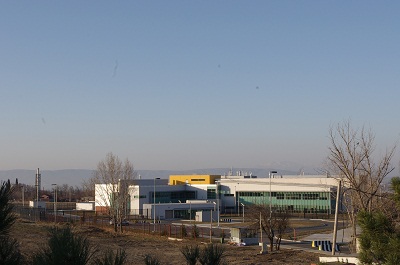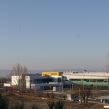
Georgian Authorities Take Over Joint US-Georgian Biological Research Facility Under Russian Pressure
Publication: Eurasia Daily Monitor Volume: 10 Issue: 140
By:

The Georgian Minister of Healthcare David Sergienko informed journalists about his final decision to establish full control over the Central Public Health Reference Laboratory named after United States Senator Richard Lugar. The laboratory, until recently, retained its independence and was considered to be a joint Georgian-American biological laboratory for the analysis of disease risks in humans and animals, epidemiological control and science research (https://interfax.az/view/580700).
The Richard Lugar Laboratory will now become an ordinary department within the Georgian healthcare ministry. Bearing in mind the US’s role—and in particular the role of the US military—in establishing the center, the decision to alter the status of the largest scientific facility on Georgian soil has critical political implications and is tied to the foreign policy orientation of the country.
The Central Public Health Reference Laboratory was inaugurated in April 2011, and Andrew Weber, the US Assistant Secretary of Defense for Nuclear, Chemical and Biological Defense Programs took part in the ceremony (https://www.civil.ge/eng/article.php?id=23257). Washington allotted $100 million for its construction, according to unofficial information (https://civil.ge/rus/article.php?id=23744). US officials openly stated that the laboratory would participate in the analysis of strategic biological risks. “The US Army plans to place specialists there that will work on these issues alongside the Georgians,” US Ambassador to Georgia Richard Norland noted (https://nregion.com/pda/txt.php?id=44549).
Richard Lugar visited the laboratory in 2012, which was then renamed in his honor to mark the Senator’s “efforts to safeguard the world from stockpiles of nuclear, chemical, and biological weapons” (https://www.civil.ge/eng/article.php?id=25103). However, influential figures in Moscow resolutely opposed these US activities in Georgia and the Americans’ willingness to cooperate with their Georgian colleagues in strategic fields of biological and chemical security. In particular, Moscow objected to the Pentagon’s participation in the construction of the large scientific center. Consequently, the Russian government signaled that the center may hinder the policy of the “reset” that took hold in the bilateral relations between Moscow and Tbilisi after Bidzina Ivanishvili’s Georgian Dream coalition won parliamentary elections in the country in 2012.
To try to neutralize this US presence in Georgia, Moscow has been playing on Tbilisi’s eagerness to open up the Russian market for Georgian goods. Small quantities of Georgian wine and mineral water already are sold in Russia (https://www.civil.ge/eng/article.php?id=25947), but Georgia would like to expand this access to a variety of its foodstuffs, including fruits and vegetables as well as meat and dairy products. However, Principal Sanitary Inspector of Russia Gennady Onischchenko, the head of the consumer protection agency Rospotrebnadzor, warned that if Georgia did not change the format of its cooperation with the US, the Russian market would remain closed to Georgian agricultural products: “The presence of the US Navy’s laboratory on Georgian territory will have a severely limiting impact on the development of trade relations between our countries” (https://www.civil.ge/eng/article.php?id=26288). He explicitly named food as “the most effective way of introducing dangerous substances into the human body that could maliciously be used for harming the health of individuals” (https://www.gazeta.ru/business/news/2013/07/20/n_3054489.shtml). Furthermore, Onischchenko claimed that the recent outbreak of African swine fever in the North Caucasus was a pre-planned act of economic sabotage from Georgian territory, which he tied to the functioning Georgian-US laboratory (https://www.civil.ge/eng/article.php?id=24644).
The Russian Ministry of Foreign Affairs simultaneously attacked the US for allegedly carrying out military-biological activities near Russia’s borders, claiming that Washington never presented Moscow with reliable proof that its Cold War–era biological weapons program was ever fully dismantled or redirected toward peaceful ends (https://www.odnako.org/blogs/show_26913/). The foreign ministry’s statement echoed accusations by Onishchenko that the laboratory in Tbilisi’s suburbs is not under Georgian control, but is fully controlled by the US (https://www.interfax.ru/russia/news.asp?id=318507).
These official statements from Moscow were directed to both, Tbilisi and Washington. Russia is signaling that the cooperation between Georgia and the US in the strategic field of biological risks research near the Russian border is undesirable. Yet, Georgia and the US openly attempted to reassure Moscow prior to the Russian government’s statements. In particular, the management of the laboratory invited officials from the office of the Russian Principal Sanitary Inspector and other Russian experts to tour the facility. “We showed them all of the laboratory so that they could see that no ‘biological weapons’ are produced [here], and that it does not pose a threat to Russia” the head of the Lugar center for disease control, Amiran Gamkrelidze, said (https://www.kommersant.ru/doc/2240124). None of these explanations or inspections apparently satisfied the Russian side, however.
Georgian authorities have finally realized that Russia is irritated not by the type of scientific research being carried out at this laboratory, but by the very existence of a Georgian-US military facility in the post-Soviet space—which then-President Dmitry Medvedev famously referred to as Russia’s zone of “privileged interest” immediately after the brief August 2008 war with Georgia (Channel One, Rossia, NTV, August 31, 2008). However, the primary reason that motivated the Georgian ruling coalition to change the status of the laboratory, according to information obtained by Jamestown, was the official silence by Washington. The US did not respond to Moscow’s unprecedented attacks that accused the US of “biological sabotage” and harboring of aggressive plans in connection to the laboratory facility. “The Georgian leadership received the impression that it was left alone against Moscow in a game of multi-dimensional pressure that Moscow crafted against [its] southern neighbor,” GHN informational agency expert David Avalishvili told Jamestown on July 27. Evidently, by rebranding the Lugar biological laboratory as a component of the Georgian Ministry of Healthcare, this implies inviting Russian specialists who will be able to follow the laboratory’s work on a permanent basis. The desire to open up the Russian market for Georgian goods was only one of the motivations of Prime Minister Ivanishvili’s team when it decided the fate of the laboratory. Another was the unwillingness to irritate Moscow while Russian tanks remain stationed 35 kilometers away from the Georgian capital. The Russian tanks are capable of cutting the only highway that connects the eastern part of Georgia with the Black Sea coast in five minutes. In an hour, the tanks would be able to reach Tbilisi’s suburbs where the Georgian-US laboratory is located (Author’s interview, July 27).




